John Janaro's Blog, page 68
October 14, 2022
October Colors? Still Mostly GREEN
We’re having (mostly) beautiful weather this week. The green is still mostly green, though you can “feel” the changes starting to happen. (Our house is behind all those leaves in the first picture.🌳 In less than two months all those branches will be bare!❄️)
The red we see right now is from some lovely roses on the “repeat blooming” rose bushes in the neighborhood. Eventually we’ll see the bright red maple leaves.




October 11, 2022
Sixty Years Ago: Saint John XXIII Opens Vatican II
But there is a further point of significance to this date. It’s connected to the whole reason why John XXIII’s feast day is October 11. Usually, a saint’s day is on (or as close as possible to) the day of his or her death. Sometimes, however, a saint’s life has a special connection to an important event in history.
In the case of Saint John XXIII, his feast day corresponds to the opening of a singular historical event in the history of the Catholic Church - an event that began as an inspiration, a special grace, within his own heart - an event destined to bear tremendous fruit in the Church and the world.
60 years ago this day, on October 11, 1962, Saint John XXIII solemnly convened the Second Vatican Ecumenical Council, an unprecedented assembly of nearly 2,500 bishops from all over the world. It was (among many other distinguishing features) the first Council to include bishops from sub-Saharan Africa and East Asia. It also had in attendance many (non-voting) observers from other Christian communities, and it was surrounded by media coverage that was new in its day for an ecclesial event, but that we have since come to take for granted.
Pope Francis marked the anniversary with a special liturgical celebration. His homily was right to the point of the wonderful gift of the Holy Spirit given to the Church in the vision of the Council, and the need of the whole Church to remain focused on it.
I present the text of the homily below, from the Vatican website. “Do you love me?” These are the first words that Jesus speaks to Peter in the Gospel that we have just heard (Jn 21:15). His final words are: “Feed my sheep” (v. 17). On the anniversary of the opening of the Second Vatican Council, we can sense that those same words of the Lord are also addressed to us, to us as Church: Do you love me? Feed my sheep.
First: Do you love me? It is a question, for Jesus’ style is not so much to offer answers as to ask questions, questions that challenge our lives. The Lord, who “from the fullness of his love, addresses men and women as his friends and lives among them” (Dei Verbum 2), continues to ask the Church, his Bride: “Do you love me?” The Second Vatican Council was one great response to this question. To rekindle her love for the Lord, the Church, for the first time in her history, devoted a Council to examining herself and reflecting on her nature and mission. She saw herself once more as a mystery of grace generated by love; she saw herself anew as the People of God, the Body of Christ, the living temple of the Holy Spirit!
This is the first way to look at the Church: from above. Indeed, the Church needs first to be viewed from on high, with God’s eyes, eyes full of love. Let us ask ourselves if we, in the Church, start with God and his loving gaze upon us. We are always tempted to start from ourselves rather than from God, to put our own agendas before the Gospel, to let ourselves be caught up in the winds of worldliness in order to chase after the fashions of the moment or to turn our back on the time that Providence has granted us, in order to retrace our steps. Yet let us be careful: both the “progressivism” that lines up behind the world and the “traditionalism” – or “looking backwards” – that longs for a bygone world are not evidence of love, but of infidelity. They are forms of a Pelagian selfishness that puts our own tastes and plans above the love that pleases God, the simple, humble and faithful love that Jesus asked of Peter.
Do you love me? Let us rediscover the Council in order to restore primacy to God, to what is essential: to a Church madly in love with its Lord and with all the men and women whom he loves; to a Church that is rich in Jesus and poor in assets; to a Church that is free and freeing. This was the path that the Council pointed out to the Church. It led her to return, like Peter in the Gospel, to Galilee, to the sources of her first love; to rediscover God’s holiness in her own poverty (cf. Lumen Gentium 8c; chapter 5).
Each one of us also has his or her own Galilee, the Galilee of our first love, and certainly today we are all called to return to our own Galilee in order to hear the voice of the Lord: “Follow me”. And there, to find once more in the gaze of the crucified and risen Lord a joy that had faded; to focus upon Jesus. To rediscover our joy, for a Church that has lost its joy has lost its love. Towards the end of his life, Pope John wrote: “This life of mine, now nearing its sunset, could find no better end than in the concentration of all my thoughts in Jesus, the Son of Mary… a great and constant friendship with Jesus, contemplated as a Child and upon the Cross, and adored in the Blessed Sacrament” (Journal of a Soul). This is our view from on high; this is our ever-living source: Jesus, the Galilee of love, Jesus who calls us, Jesus who asks us: “Do you love me?”.
Brothers and sisters, let us return to the Council’s pure sources of love. Let us rediscover the Council’s passion and renew our own passion for the Council! Immersed in the mystery of the Church, Mother and Bride, let us also say, with Saint John XXIII: Gaudet Mater Ecclesia! (Address at the Opening of the Council, 11 October 1962). May the Church be overcome with joy. If she should fail to rejoice, she would deny her very self, for she would forget the love that begot her. Yet how many of us are unable to live the faith with joy, without grumbling and criticizing? A Church in love with Jesus has no time for quarrels, gossip and disputes. May God free us from being critical and intolerant, harsh and angry! This is not a matter of style but of love. For those who love, as the Apostle Paul teaches, do everything without murmuring (cf. Phil 2:14). Lord, teach us your own lofty gaze; teach us to look at the Church as you see her. And when we are critical and disgruntled, let us remember that to be Church means to bear witness to the beauty of your love, to live our lives as a response to your question: Do you love me? And not to act as if we were at a funeral wake.
Do you love me? Feed my sheep. With that second verb, feed, Jesus expresses the kind of love that he desires from Peter. So let us now reflect on Peter. He was a fisherman whom Jesus made a fisher of men (cf. Lk 5:10). Jesus assigns him a new role, that of a shepherd, something entirely new to him. This was in fact a turning point in Peter’s life, for while fishermen are concerned with hauling a catch to themselves, shepherds are concerned with others, with feeding others. Shepherds live with their flocks; they feed the sheep and come to love them. A shepherd is not “above” the nets – like a fisherman – but “in the midst of” his sheep. A shepherd stands in front of the people to mark the way, in the midst of the people as one of them, and behind the people in order to be close to the stragglers. A shepherd is not above, like a fisherman, but in the midst.
This is the second way of looking at the Church that we learn from the Council: looking around. In other words, being in the world with others without ever feeling superior to others, being servants of that higher realm which is the Kingdom of God (cf. Lumen Gentium 5); bringing the good news of the Gospel into people’s lives and languages (cf. Sacrosanctum Concilium 36), sharing their joys and hopes (cf. Gaudium et Spes 1). Being in the midst of the people, not above the people, which is the bad sin of clericalism that kills the sheep rather than guiding them or helping them grow. How timely the Council remains! It helps us reject the temptation to enclose ourselves within the confines of our own comforts and convictions. The Council helps us imitate God’s approach, which the prophet Ezekiel has described to us today: “Seek the lost sheep and lead back to the fold the stray, bind up the injured and strengthen the weak” (cf. Ezek 34:16).
Feed: the Church did not hold the Council in order to admire herself, but to give herself to others. Indeed, our holy and hierarchical Mother, springing from the heart of the Trinity, exists for the sake of love. She is a priestly people (cf. Lumen Gentium 10ff.), meant not to stand out in the eyes of the world, but to serve the world. Let us not forget that the People of God is born “extrovert” and renews its youth by self-giving, for it is a sacrament of love, “a sign and instrument of communion with God and of the unity of the entire human race” ( Lumen Gentium 1). Brothers and sisters, let us return to the Council, which rediscovered the living river of Tradition without remaining mired in traditions. The Council rediscovered the source of love, not to remain on mountain heights, but to cascade downwards as a channel of mercy for all. Let us return to the Council and move beyond ourselves, resisting the temptation to self-absorption, which is a way of being worldly. Once more, the Lord tells his Church: feed! And as she feeds, she leaves behind nostalgia for the past, regret at the passing of former influence, and attachment to power. For you, the holy People of God, are a pastoral people. You are not here to shepherd yourselves, or to be on the climb, but to shepherd others – all others – with love. And if it is fitting to show a particular concern, it should be for those whom God loves most: the poor and the outcast (cf. Lumen Gentium 8; Gaudium et Spes 1). The Church is meant to be, as Pope John put it, “the Church of all, and particularly the Church of the poor” (Radio Message to the faithful worldwide a month prior to the Second Vatican Ecumenical Council, 11 September 1962).
Do you love me? The Lord then says: “Feed my sheep”. He does not mean just some of the sheep, but all of them, for he loves them all, affectionately referring to them as “mine”. The Good Shepherd looks out and wants his flock to be united, under the guidance of the Pastors he has given them. He wants us – and this is the third way of looking at the Church – to see the whole, all of us together. The Council reminds us that the Church is a communion in the image of the Trinity (cf. Lumen Gentium 4.13). The devil, on the other hand, wants to sow the darnel of division. Let us not give in to his enticements or to the temptation of polarization. How often, in the wake of the Council, did Christians prefer to choose sides in the Church, not realizing that they were breaking their Mother’s heart! How many times did they prefer to cheer on their own party rather than being servants of all? To be progressive or conservative rather than being brothers and sisters? To be on the “right” or “left”, rather than with Jesus? To present themselves as “guardians of the truth” or “pioneers of innovation” rather than seeing themselves as humble and grateful children of Holy Mother Church. All of us are children of God, all brothers and sisters in the Church, all of us making up the Church, all of us. That is how the Lord wants us to be. We are his sheep, his flock, and we can only be so together and as one. Let us overcome all polarization and preserve our communion. May all of us increasingly “be one”, as Jesus prayed before sacrificing his life for us (cf. Jn 17:21). And may Mary, Mother of the Church, help us in this. May the yearning for unity grow within us, the desire to commit ourselves to full communion among all those who believe in Christ. Let us leave aside the “isms”, for God’s people do not like polarization. The people of God is the holy faithful people of God: this is the Church. It is good that today, as during the Council, representatives of other Christian communities are present with us. Thank you! Thank you for being here, thank you for your presence!
We thank you, Lord, for the gift of the Council. You who love us, free us from the presumption of self-sufficiency and from the spirit of worldly criticism. Prevent us from excluding ourselves from unity. You who lovingly feed us, lead us forth from the shadows of self-absorption. You who desire that we be a united flock, save us from the forms of polarization and the “isms” that are the devil’s handiwork. And we, your Church, with Peter and like Peter, now say to you: “Lord, you know everything; you know that we love you” (cf. Jn 21:17).
October 10, 2022
Christina Grimmie’s Advice About “Bullying”

Remembering Christina Grimmie, six years and four months later. This simple piece of advice is good advice. It’s not as easy as it sounds, but it’s worth the effort.💚💚
Teenagers are particularly vulnerable to bullying, but it happens in many forms, and on many levels, bringing suffering to people of all ages. We must not let bullying define us. We each have unique dignity and value as human persons because we are created in God’s image. God loves each one of us immensely. Knowing that we are precious to Him, we can respond to bullies and haters *with love* (as Christina did). Thus, we will grow in confidence in the truth about ourselves (as persons loved by God), and -we hope - the bully will experience that he or she *is also LOVED* - perhaps one simple gesture from us will contribute to a change in their hearts, so that they will come to know the truth about their own humanity - that they too are uniquely precious to God - and will begin to experience healing.💚💚
October 7, 2022
War and Peace and the Rosary
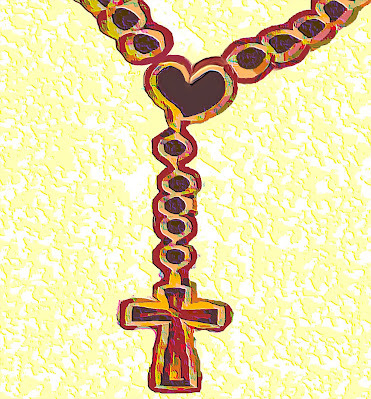 The Mother of Jesus, the Mother of the Person of the Word who took flesh in her womb, the Mother of God the Son and the Mother of all of us whom He has claimed as His brothers and sisters in His redemption, is the Queen of Peace.
The Mother of Jesus, the Mother of the Person of the Word who took flesh in her womb, the Mother of God the Son and the Mother of all of us whom He has claimed as His brothers and sisters in His redemption, is the Queen of Peace.She brings peace to those who call upon her, and that can entail helping to protect us from the oppressor, from men of violence who want to bring ruin and destruction to our land and make us slaves. When we are required to defend ourselves and our country from ruthless invaders, Mary will help us not only to prevail, but also to remain lovers of peace in our hearts, to be free from lust for vengeance, to fight honorably, with justice, and with love - hoping for the enlightenment and conversion of our enemies, and (as Chesterton put it) fighting not out of hatred for the enemy in front of us, but out of love for all that is behind us: our homes, our families, our culture, identity, freedom as a people, and especially for the most poor and vulnerable of our communities who are already suffering violence from the enemy’s attack.
Even in legitimate self-defense - which ought not to be called “violence” because it is by nature resistance against violence - there is the danger of degenerating into unjust actions, using unjust and dehumanizing means as a more expedient (or more hate-filled, revenge-filled) means to attain legitimate purposes, to “do evil so that [a ‘greater’] good may come from it.” Alas, the history of armed conflict is riddled with injustices on all sides (as is the history… of everything else). We hope, however, for a preponderance of discretion and proportion in the defensive use of force, humility and repentance for failures, and prayer for perseverance in the cause of protecting one’s own people, and restoring peace and security against the aggressor.
On October 7, 1571, the pope called on all Latin Catholics to pray the Rosary for the protection of Western Europe from a brutal and overwhelming invasion by the “Islamic State” of that time, and the world-absorbing aspirations of its powerful “Caliphate,” the sultans of Ottoman Turkey. On that day, a much-outnumbered European naval force turned away a massive Turkish invasion at Lepanto.
In this month of October 2022, we are once again praying the Rosary for peace. For the past seven months, Ukraine has been robbed of its peace by a monstrous invasion of Russian military forces that have been compelled to play out the grandiose and paranoid imperial fantasies of Vladimir Putin. The Ukrainians have a right to defend themselves, and their persistence - against all odds - has earned the admiration of the world.
Ukraine has understandably turned to the enormously wealthy and technologically advanced “western democracies” (in Europe and the U.S.A.) for help. And they have received a continuous flow of highly sophisticated and otherwise-unthinkably expensive weapons (one can only hope that the Ukrainians won’t have to pay too high a price for them in the future, in terms of their own freedom to shape their country’s social and economic life).
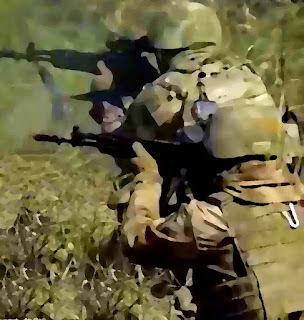 Does anyone think that the mendacious thug-ocracy that rules Russia can be trusted to play a constructive role in Ukraine’s future? Many things must change, starting with respect for the borders recognized by international law and guaranteed by Russian treaty obligations. Of course, we hope for greater things. We are praying (especially since the March 25, 2022 Consecration) for the “conversion of Russia” through Mary’s intercession.
Does anyone think that the mendacious thug-ocracy that rules Russia can be trusted to play a constructive role in Ukraine’s future? Many things must change, starting with respect for the borders recognized by international law and guaranteed by Russian treaty obligations. Of course, we hope for greater things. We are praying (especially since the March 25, 2022 Consecration) for the “conversion of Russia” through Mary’s intercession.While we’re at it, let us continue to pray for the “conversion” of the uber-affluent, corrupt, insatiable, agnostic, deeply confused Western world. The West today is hardly more trustworthy, in the long run, than the Russians. No one can imagine where “the West” is headed in its pursuit of money, power, distraction, and licentiousness. How big a hole will it dig in the earth? We pray for the conversion of the West, which - for many of us - includes the conversion of ourselves.
We are also praying for the conversion of Ukraine, which - along with Russia - was specially consecrated to the Immaculate Heart of Mary this past March. Something like a miracle is needed for the survival of Ukraine and the avoidance of a longer, vastly larger, and potentially cataclysmic war in the whole region and beyond it. Miracles are possible. October 13 marks the 105th anniversary of the miracle of Our Lady of Fatima, who has promised a period of peace for our poor world.
Dare we hope - through the intercession of Mother Mary, the Virgin of Tenderness - that these momentous and tumultuous events in Ukraine (beginning in 2014) are forging a great nation - a nation of genuine democracy and solidarity, a nation whose people are not afraid to draw from the riches of a millennium of history, the hidden fruits of the terrible suffering of the past century, and the vitality of the Christian inspiration that has always grounded these people? Ukraine needs a renewed Christian inspiration, purified from past prejudices and extreme ethno-nationalist pretensions, and freed to be true to its heart as an evangelical love that vivifies the whole of Ukrainian society while respecting the freedom of everyone.
We should keep all these needs and hopes in our hearts this month, and beyond, when we pray the Rosary. Mary wants to bring us to her Son and His saving love. She is also a tender mother to us. She knows that our lives are difficult and laden with many burdens. She wants to bring peace. She wants all her children to love one another, to respect and appreciate one another, to help and live in solidarity with one another.
Mary is the Queen of Peace, of every kind of true peace, and she brings us hope in these violent times.
October 6, 2022
“Sweater Weather”
October 5, 2022
The Lord Hears Our Cries, and Answers With His Mercy
 In times of crisis, prayer may seem particularly perplexing. Sometimes God seems to be "remote," and we may think we don't "deserve His attention" because of our guilt, or our conflicted emotions, our lack of courage, our lack of faith, our lack of even beginning to know how to approach Him or what to ask of Him. The time of crisis is so totally beyond our power that we don't even know where to begin, how to bring our acute brokenness before the silence of God. Crushed in spirit, the question "Why?" arises within us. The human heart—made for the Infinite—struggles especially in relating to God when faced with circumstances that seem closed off, when human understanding sees no way forward or no way out.
In times of crisis, prayer may seem particularly perplexing. Sometimes God seems to be "remote," and we may think we don't "deserve His attention" because of our guilt, or our conflicted emotions, our lack of courage, our lack of faith, our lack of even beginning to know how to approach Him or what to ask of Him. The time of crisis is so totally beyond our power that we don't even know where to begin, how to bring our acute brokenness before the silence of God. Crushed in spirit, the question "Why?" arises within us. The human heart—made for the Infinite—struggles especially in relating to God when faced with circumstances that seem closed off, when human understanding sees no way forward or no way out."I have often listened to people who are experiencing difficult and painful situations, who have lost a great deal or feel lonely and abandoned and they come to complain and ask these questions: Why? Why? They are in upheaval against God. And I say, 'Continue to pray just like this, because this also is a prayer.' ...It is prayer in times of darkness, in those moments of life that seem hopeless, where we cannot see the horizon" (Pope Francis).
There is no human person in the world who cannot pray, somehow. So often that desperate question— that apparently angry or frustrated interrogation that asks, "Why?"—is really a kind of plea, a begging of the heart for radical help. The human heart is searching for the mercy of God.
No human predicament is beyond the reach of God’s mercy. His mercy is working in us during the most terrible sufferings, and His mercy seeks to empower each one of us to bear those sufferings and offer them out of love for Jesus, and with Him for the salvation of the world.
We can't imagine what this profoundly personal mercy "feels like," or how it is transforming the depths of our lives. We may experience relief and consolation insofar as the good Lord knows we need it on this mysterious road toward our perfection in Him. But the anguish we bear and the incomprehension we sometimes express are full of His presence, and He is changing us even through these moments of "darkness" (especially through them), if we let Him.
Of course, we can resist Him. We can try to run away and hide amidst superficial distractions and shallow comforts, but these evasions can never satisfy us. In the disappointment they inevitably bring, we find that once again our hearts are raising the awful question. Once again, we are provoked by our need for the Infinite and we wrestle with the question, "Why? Why?" Resentment and yearning clash within us, but there is also grace at work.
This is a question that lives on the edge of human freedom, fraught with the temptation to give up entirely on God, but also drawn by a hope—however incoherent it may be—that wants to ask God for mercy.
No human predicament, no degree of moral and spiritual disgrace, is beyond the reach of God’s mercy.
Perhaps you may object, even vigorously, that you don’t want God’s mercy.
There are some people who really don’t want God’s mercy. Generally, they don’t even think of it, because they don't think they need anything beyond themselves. We need to pray especially for these people.
Then there are people who say to themselves, “I don’t think I want God’s mercy!”
But if you are roused to consider God's mercy at all, it is because His call is provoking you in the depths of your heart. When you recognize the possibility of God's mercy, it is because you have already begun—somewhere within yourself—to desire it.
Are you angry with the Lord? Bitter? Are you shaking your fist at God? But He looks upon you in all your fury and frustration like a parent patiently caring for a small child. Look at your little fist, that fist made up of human fingers. God loves that fist of yours. With an infinitely more profound tenderness than any human mother or father can ever begin to have, God looks upon you with radically unconditional love. God is your Father—He made your fist. He knows every line of every finger.
He wants so much to uncurl those stubborn fingers and open your hand.
“But I don’t know how to ask God for mercy!” Well, in that case, ask Him to enable you to ask Him for mercy. From wherever you are, right now, you can cry out to Him; you can begin to ask Him to show you His mercy and give you a heart that wants His mercy. Everything good comes from Him.
So even if you look at yourself and say, “I am totally evil,” you can turn to Him and ask for a little drop of His goodness, and He will give it to you. If you don't think you even want that little drop, ask Him to give you the desire for it. “Ask and you shall receive”—what a simple promise!
 In the face of our total incompetence and unworthiness, He loves us. He doesn't wait for us to ask, even, before He draws near to us. God sent His Son Jesus into the world "while we were still sinners" (before we even had a thought for Him). Jesus loved us first, He died and rose from the dead for us, He wants to be with us.
In the face of our total incompetence and unworthiness, He loves us. He doesn't wait for us to ask, even, before He draws near to us. God sent His Son Jesus into the world "while we were still sinners" (before we even had a thought for Him). Jesus loved us first, He died and rose from the dead for us, He wants to be with us.The Lord showers upon us His mercy, not to the demand of our measure and expectations, but because He loves us. We are made for Him, and we need Him. He draws us through the journey of life to ask for and to receive His love, so that we might freely love Him and share in His unending life. He gives His mercy beyond all measure, long in anticipation of our awareness, and then in response to our recognition that we really do need Him.
Sometimes He seems to "delay," but this is only because He wants us to keep asking; in this we touch upon one aspect of the mystery of our irreplaceable personal vocation. Jesus accompanies us on every step of that vocational journey, no matter how difficult. We can be confident that He wants us to experience our total need for Him so that we can grow greater in the love He gives us.
Ask, keep asking, and never give up. You shall receive… it is a promise from God.
October 4, 2022
Francis on Francis
October 1, 2022
“To Die of Love…”
October 1: The incomparable Saint Thérèse! Pray for us.
“To die of Love…to die of Love, this is my hope” (Saint Thérèse, during the last stages of her fatal illness).
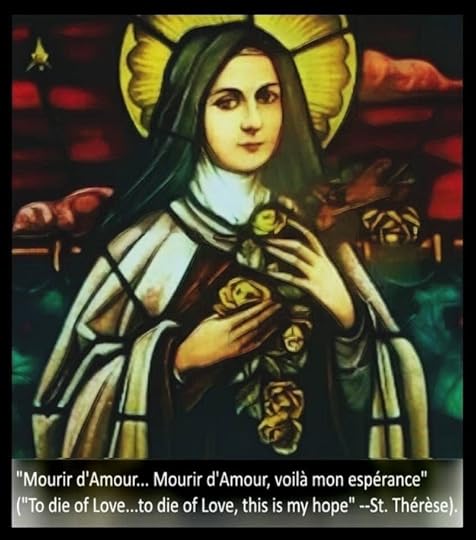
September 30, 2022
Francis on the Prayer of “Ciao”
“Let us ask for this grace:to live a relationship of friendship with the Lord,as a friend speaks to a friend.I knew an old religious brother who wasthe doorman of a boarding school,and every time he could, he would approach the chapel,look at the altar, and say, ‘Hello,’ [“Ciao” in Italian]because he was close to Jesus.He didn’t need to say blah blah blah, no:‘Hello,I am close to you and you are close to me.’This is the relationship we must have in prayer:closeness, affective closenessas brothers and sisters, closeness with Jesus.A smile, a simple gesture,and not reciting words that do not reach the heart.As I said,talk to Jesus as a friend talks to another friend.
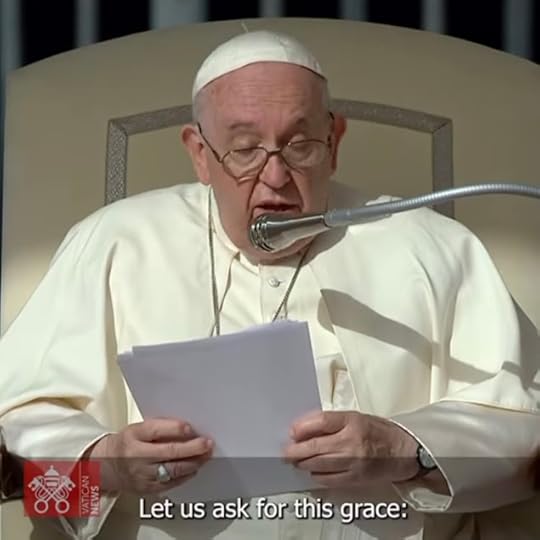
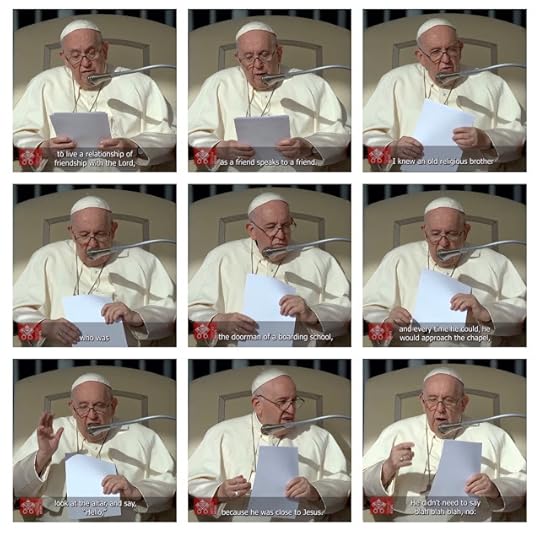
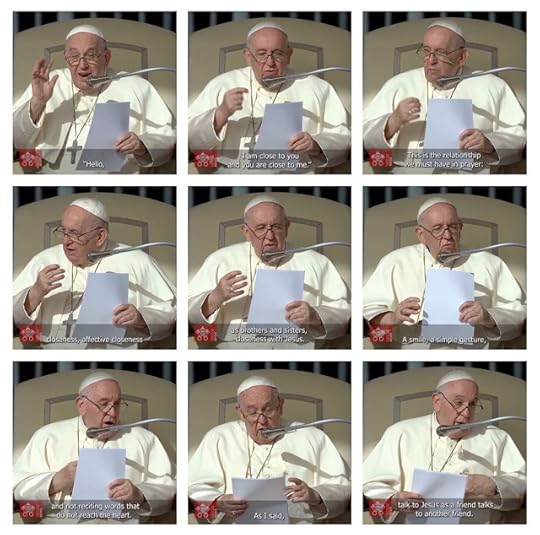
September 29, 2022
Saint Michael, Help End this Horrible War!
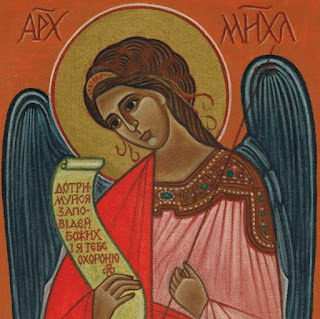 Today is the feast day of the Archangels: Saint Michael, Saint Gabriel, and Saint Rafael. We really need their help in the grave moments that are coming upon so many peoples in this world.
Today is the feast day of the Archangels: Saint Michael, Saint Gabriel, and Saint Rafael. We really need their help in the grave moments that are coming upon so many peoples in this world.The picture here is a detail from a UKRAINIAN Byzantine icon of Saint Michael. The suffering that continues in Ukraine after seven months of invasion is staggering. Now there are new perils and unimaginable dangers that might result from the Russian leadership's desperate escalation of the stakes in their own disastrous and largely-failed invasion. Prayer is especially necessary in these days.
Holy Archangels, pray for us.
Saint Michael, I beg you to protect Ukraine, and help deliver Russia from the rule of a tyrant. Help deliver all people in this conflict and throughout the world from the machinations of those in power who think themselves to be "gods" and authorize themselves to crush the dignity of human persons under their feet.
Protect and give courage especially to Russian young men who are now being drafted into the military, that they will refuse to kill their brothers in this unjust, horrible war of aggression.
Holy Archangels, protect our poor world from the scourge of war, and pray for the conversion of every heart to the One who's coming was announced by Saint Gabriel.





